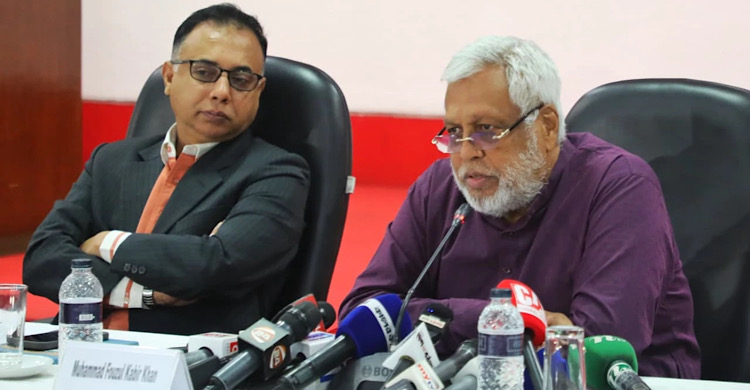Focus on stopping today’s corruption, not just on past: Energy Adviser


Power, Energy, and Mineral Resources Adviser Muhammad Fouzul Kabir Khan on Thursday said corruption in the energy sector often occurred within a framework of supportive laws and flawed policies.
While the interim government had worked to reduce corruption and repaid most of the country USD 3.2 billion energy debt, he said it lacked sufficient time to undertake deeper reforms.
Speaking at a dialogue, the Adviser acknowledged dissatisfaction with anti-corruption efforts, highlighting that vested interests benefit from corruption and that focus should shift from investigating past misdeeds to addressing present-day corruption.
The Centre for Governance Studies (CGS) hosted the dialogue at the CIRDAP (Centre on Integrated Rural Development for Asia and the Pacific) auditorium.
Zillur warned that Bangladesh is facing a security crisis which may deepen if elections are not held on time.
He noted that the issues of security, energy, and corruption are interlinked and highlighted the key questions for debate, including the risks posed by great power rivalries, the urgent need for border protection, the modernisation of defence and cybersecurity, the formulation of a national security policy, and the constitutional and legal reforms necessary to combat corruption. Questions were also raised on strengthening the Anti-Corruption Commission (ACC), implementing a realistic anti-corruption strategy, addressing budget loopholes that legalise illicit wealth, ensuring uninterrupted electricity, reducing reliance on energy imports, expanding renewable energy, and increasing transparency in major projects such as the Rooppur Nuclear Power Plant.
Moyeen Khan outlined five key dimensions of security: state, economy, politics, diplomacy, and society.
He stressed that people’s security must come first, encompassing environmental safety, technological challenges, food security, media literacy, and energy. He argued that diversity of thought must be protected and that security should not be viewed merely as protecting those in power.
Badiul Alam emphasized political stability as a cornerstone of national security, underscoring the need for free and fair elections.
He recounted discussions with citizens who admired the parliament building’s beauty but lamented the corruption of those in power.
He argued that corruption has undermined recent elections, warning that without reforming politics and curbing money’s influence, democratic processes cannot function properly.
Muniruzzaman argued that the opportunity to enact meaningful reforms following the recent uprising has already been missed.
He highlighted gaps in Bangladesh’s national security, including the lack of a comprehensive national security policy, unresolved transboundary water disputes, rising sea levels threatening much of the country, and the absence of policies to address these issues.
He also raised concerns about border killings, drug smuggling, small arms trafficking, inadequate defense modernization, and Bangladesh’s lag in hybrid warfare and information warfare capabilities. He insisted that internal unity and modernization are essential for national security.
Speaking at the dialogue, Parvez Karim Abbasi emphasised that security encompasses not only hard defense but also economy, water, and cyber security.
He pointed to the ongoing power struggle among the United States, China, and India, the fragility of U.S.-India relations, uprisings in neighbouring countries such as Nepal, and the unresolved crisis in Myanmar and the Rohingya refugee issue.
Abbasi highlighted the growing challenge of water security due to upstream dams in India and China and warned that rising foreign debt could undermine Bangladesh’s sovereignty. Cybersecurity risks, including data theft, also threaten the nation.
He concluded that the era of non-alignment has ended, and Bangladesh must now strategically align with a major power to survive, requiring a synchronized national plan.
Monju stressed that threats must be considered alongside strengths and opportunities. He noted that AB Party has identified 22 challenges facing the country, including crises in electricity, education, and healthcare.
He argued that tackling corruption would have positive effects across all sectors, and proposed digitalization of service delivery as part of the solution. He also called for fair elections to strengthen democratic norms.
Ambassador M Shafiullah observed that in international relations, today’s allies can easily become tomorrow’s rivals, underscoring the volatility of geopolitics.
Mollah M Amzad Hossain described the energy sector as the epicentre of corruption, criticizing policies that burden Bangladesh with unused capacity charges.
He called for reducing reliance on energy imports by developing domestic coal and renewable energy.
Inam Ahmed linked security issues directly to the democratization of Bangladesh, noting that past regimes systematically weakened institutions to facilitate corruption.
He warned that without a free press, there can be no accountability, and argued that independent media is essential for combating corruption and ensuring security.
